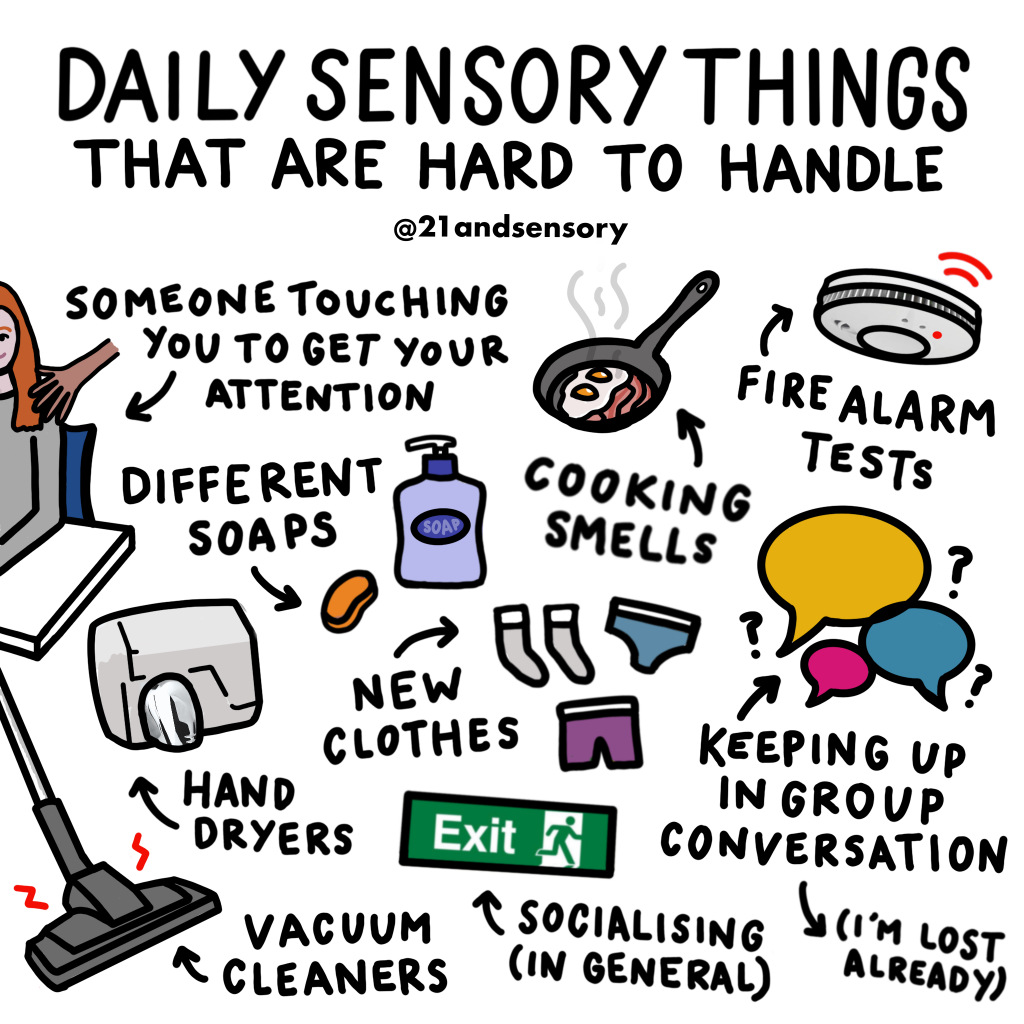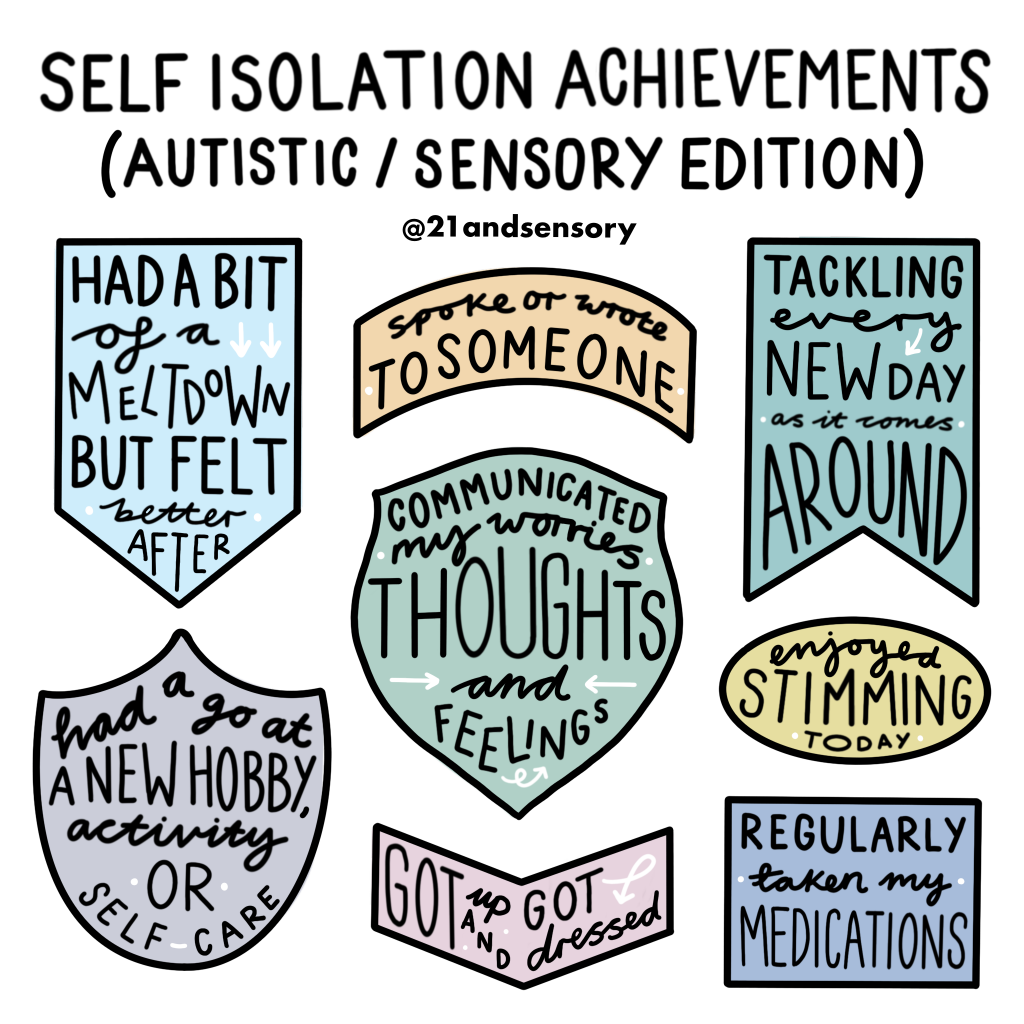
Emily is a graphic designer from the UK who is a blogger and illustrator in her spare time. She blogs at 21andsensory and also hosts her own podcast where she discusses topics relating to autism and sensory processing disorder (SPD). Emily blogs in order to bring people together to discuss their sensory problems and how they cope. It’s her mission to help others understand that sensory problems aren’t something children necessarily grow out of, but learn to live with and adapt to for the rest of their lives. This week Emily shared her positive diagnosis story and the ways she lives with and manages SPD.
In your article about your diagnosis story, you mention that your assessor told you “Congratulations,” as she delivered your diagnosis, and that you were grateful for hearing that, rather than “I’m sorry.” Did you have a negative association with autism prior to your assessment? How did you assessor’s delivery of the diagnosis shape your understanding and processing of it?
Yes! I was so so grateful my assessor was so positive and congratulatory about my diagnosis. I had read up a lot about the diagnostic process and also spoken to some amazing people on Instagram and online in general about their autism diagnosis journeys. A lot of people I spoke to had been told their diagnosis in very medical or straight/negative ways, which I think is not okay at all. I definitely didn’t have a negative association with autism prior to my assessment, I just had a worry in the back of my mind as to how I would cope with what was going to be said to me on the day.
The way my assessor delivered my diagnosis was huge to me and will stay with me forever. She allowed me to understand that in no way is a diagnosis a bad thing or a ‘label’ to be stuck with, but actually something that brings clarity. This has enabled me to continue to process all my difficulties and struggles (and cut myself some slack). I now appreciate that I am managing myself as best as I can.
In what ways does SPD affect you most profoundly as an adult?
Sensory processing issues are a constant thing for me – my senses are ridiculously heightened at all times, so even little things such as someone touching me on the shoulder/arm during a conversation or coping with different noises and scents can hugely overwhelm me.
My mood can change so quickly if I am overwhelmed by something as I cannot filter the information coming into my brain, and I cannot regulate my emotions or understand and label my own feelings (I was told by my autism assessor that this is referred to as Alexithymia). This means day-to-day it can be quite tiring being out in the world, and as a result, I’ve become very good at masking (hiding my true thoughts/feelings), and I can only really drop that mask when I am in a safe environment like my home.
At the moment I am working from home (due to COVID-19), but I usually work in an open plan office during the week. I find it such a difficult and distracting environment, so I am currently really enjoying being able to work from home in my own environment and in the quiet. I can also be myself and use fidget toys and get up and move when I like!

You mention on your website that you tried several different therapies to help you address your SPD, but many of them were unhelpful and made you feel worse. Can you explain why they weren’t helpful and how they made you feel?
I’ve tried lots of different therapies such as Cognitive Behavioural Therapy (CBT) and therapy sessions with CAMHS (child and adolescent mental health service, NHS, UK) as well as self-funding private therapy sessions. The last therapy I had was CBT (I was paying for therapy privately with a psychologist). I was told after a number of sessions that she could no longer continue to see me as she felt I had autistic traits and needed to go to my GP for an autism assessment/diagnosis. I found this really hard because it takes so much time and effort on my part to open up to people and drop my ‘mask.’
I think therapy has always made me feel worse because I have been constantly made to bring up and analyse the past, which in turn makes me overthink things and ultimately makes me feel worse. I think if I was to go for therapy again, I would try and find a therapist who was more understanding of autism and sensory processing difficulties as I don’t think a ‘normal’ setting of therapy suits me at all.
I have however found Occupational Therapy (OT) to be the most helpful form of therapy (I had this in sessions as a child and then later as a teenager privately). It’s very much a ‘doing’ sort of therapy that helps you identify aspects of daily life in your home, school, or workplace that you find difficult. You then work on identifying particular issues and on building coping mechanisms and desensitising yourself (if you have sensory processing difficulties) to things such as brushing your hair and teeth, managing in loud environments, dealing with sensory overload / burnout, etc.

Do you have any therapy (or general living advice) recommendations for others with SPD or for parents of children with SPD?
Yes, as I mentioned in the previous answer I really do recommend Occupational Therapy, and I wish it wasn’t just a therapy that was mainly associated with children and toddlers.
Hmm general living advice….I think living and just existing in general can be really difficult for those with SPD. Our senses are running on high alert and are heightened 24/7. We have this inability to filter and process these signals into our brain which inevitably can lead to tears, sensory meltdowns and burnout. I find it really hard to communicate my thoughts and feeling, so I’m very much an advocate of writing things down. I do this a lot at home – I write things down and share them with my mum so she knows what’s going on inside my head and she can then sort of see if a meltdown might be on the horizon. I think it’s important to give people with SPD time, space, and a lot of patience. I appreciate that this is super difficult, but it’s really so helpful.
Another piece of advice I would give would be to rephrase your questions if you can. So for example, I think rather than asking someone with SPD ‘Are you okay?’ if they look a bit overwhelmed or slightly zoned out (I always reply ‘I’m fine’ even if I’m not!) it’s worth reframing your questions such as ‘Do you want to step outside for 5 mins?’ or ‘Would you like to go somewhere quieter?’ I’d be more likely to answer questions like these more honestly.
Tell me about your 21and Sensory podcast. What inspired you to begin the podcast? Who is your audience?
So I decided in 2017 that I might quite like to start up a podcast where I could ramble, give advice, talk about my life and situations I’ve been in (and learnt from), and just generally chat. It’s really evolved from there and recently I’ve been inviting guests on for chats.
I think I was initially inspired and encouraged by the online sensory community and lovely comments and reactions to my blog posts at the time. I think my Instagram presence has also helped to spread the word of my podcast, and I’ve gained a lot of subscribers from the amazing autistic community on there.
I quite like the audio format as I can read out my blog posts, chat about things I’m struggling with and have honest discussions with people from all walks of life and really learn from them. Also, as a sensory-being, I sometimes think it’s nice to switch and listen to someone talk rather than always reading things online.
What do you love most about your job as a graphic designer?
I’m a really visual person, so I love being a graphic designer – it’s luckily something that comes quite naturally to me. I have this ability to really hyper-focus in on creative briefs I am set to do at work and also within my own side projects. I do tend to lose track of time as I get quite into what I am working on! I think both my SPD and autism both help me creatively.
I think in my job role I’ve become not only a more proficient problem-solver, but someone who is constantly learning. I know it’s okay to look things up online, and as a result, I am always furthering my knowledge and skills.
Also: routine is a massive thing for me. I enjoy having a full time job that keeps me busy 9am-5pm during the week. It’s something I can really set my mind to, and I need this structure in my life in order to exist!
Name something you have heard a neurotypical say that was offensive to you as an individual on the spectrum (but the NT was completely unaware of their offense).
Frustratingly I can think of a particular occasion straight away. I saw a consultant at my local hospital for an appointment, and he wanted to go over my medical history (I was more than happy to do this so I proceeded) I explained what medications I was on and the reasons behind them and explained about past therapy I have had – not particularly exciting. I happened to mention briefly that following the therapy I’m actually awaiting an autism assessment (this was last year).
This was the conversation that followed…
Consultant: ‘Oh really?’
Me: ‘Erm yes…’
Consultant: ‘But you don’t look like you have autism.’
Me: *has no words*
I felt like he shouldn’t have said that and maybe he didn’t mean to phrase it that way…but I remember at that time thinking it over, and it was actually really harmful. To say to someone ‘you don’t look autistic’ is not in anyway okay and at the time I was awaiting my assessment, which was quite personal and private to me. You cannot say someone is or isn’t autistic by looking at them (it’s common sense–am I right?!) and I just thought and expected so much better from a consultant.
In addition to her website, you can also follow Emily on social media:
Instagram: https://www.instagram.com/21andsensory/
Twitter: https://twitter.com/21andsensory
